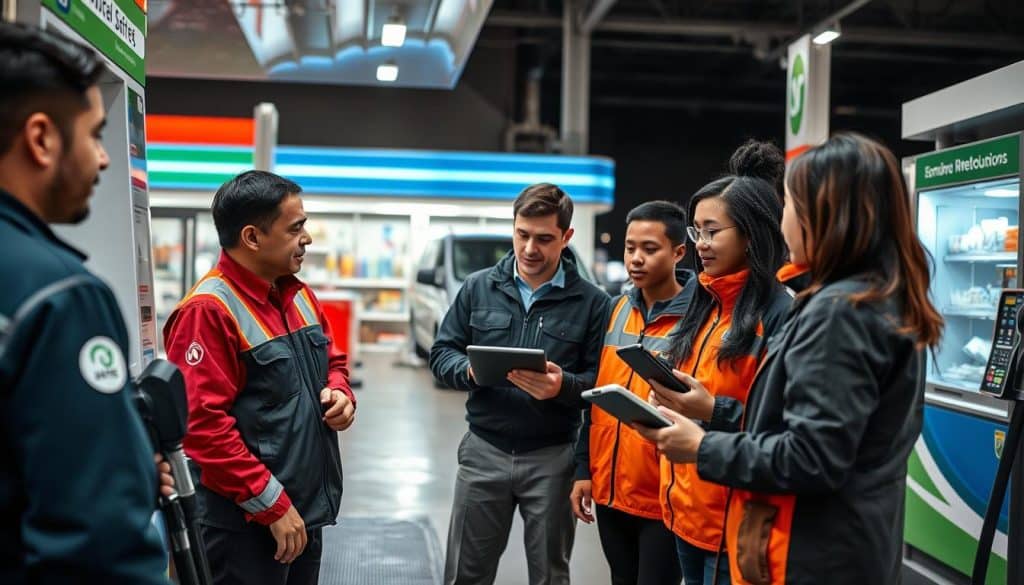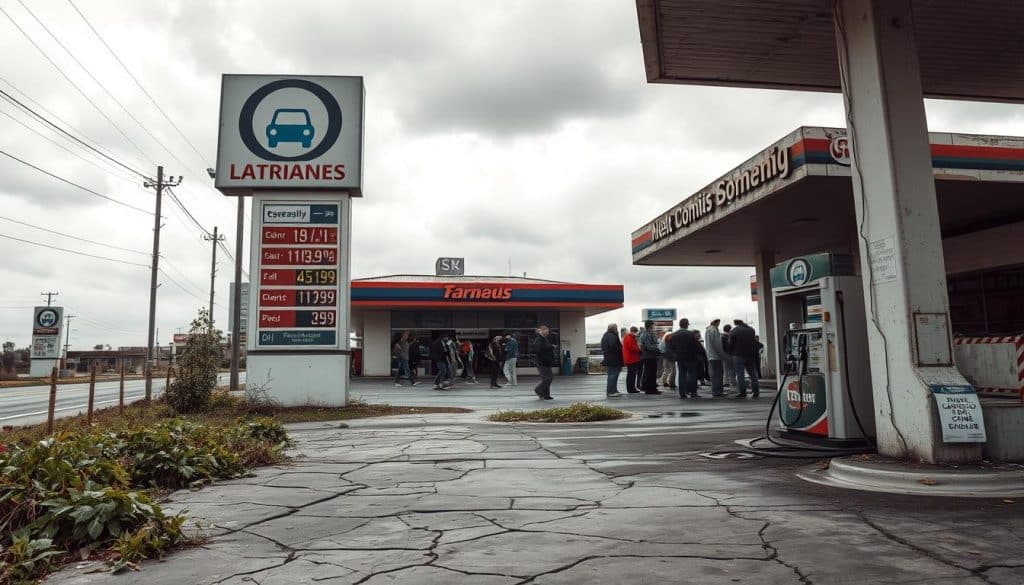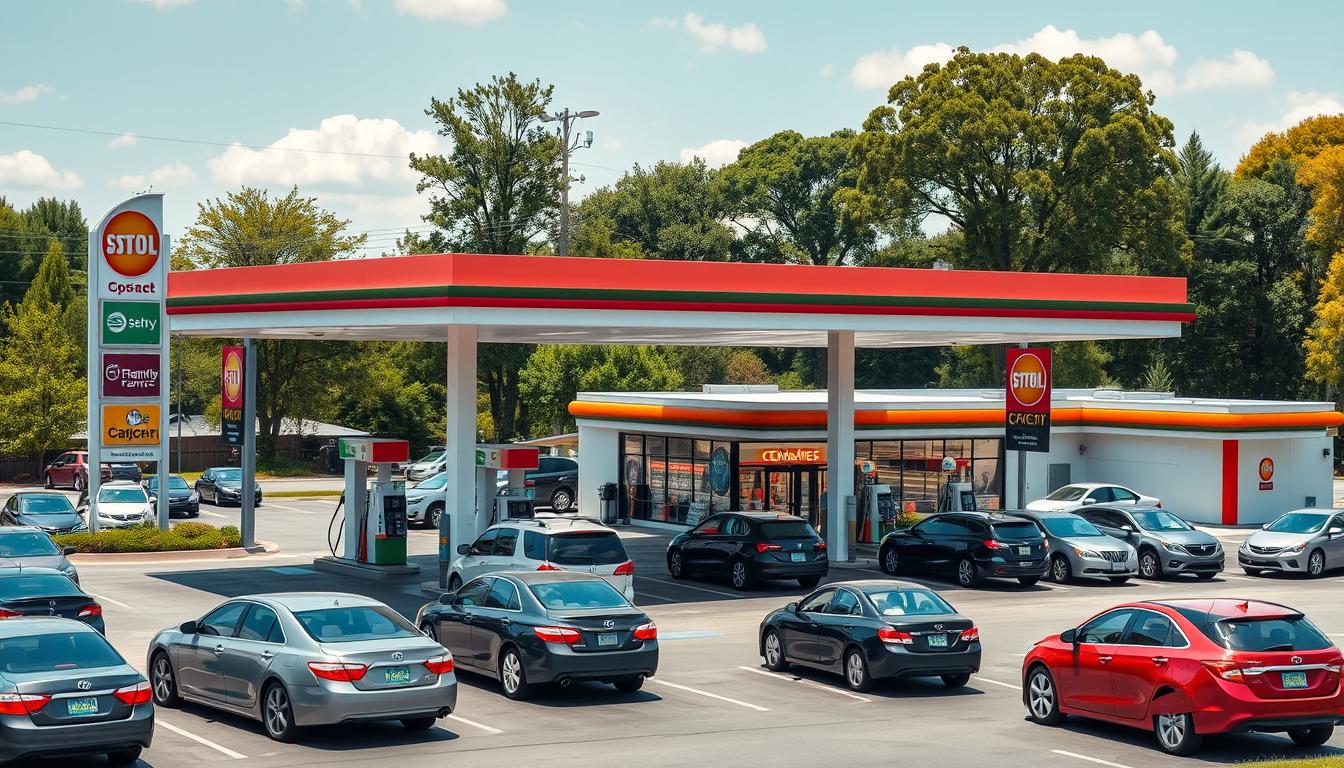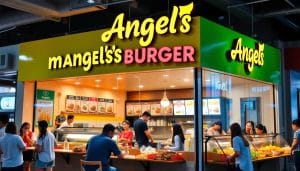Could owning a gas station be the secret to making money in today’s world? The fuel services market is booming, and gas station franchises offer many chances for entrepreneurs. These opportunities promise growth, stability, and a steady flow of customers.
This article will cover everything you need to know about gas station franchises. We’ll look at different franchising models, financial aspects, and how to manage operations. Join us as we dive into the world of gas station franchises.
Key Takeaways
- The gas station franchise market offers a range of investment levels and opportunities.
- Major players like Circle K, Chevron, and Shell provide diverse franchise models.
- Financial investments vary significantly, with some starting as low as $37,550.
- Site selection and location play critical roles in the success of a gas station franchise.
- Operational management, including staff training, is vital for franchise success.
- Marketing strategies tailored to local audiences can significantly boost profitability.
- Success stories reveal valuable lessons for aspiring gas station franchise owners.
Introduction to Gas Station Franchising
The gas station franchise is a special business model. It combines a well-known brand with a managed way of working. This gives franchisees a big advantage over those who own their own gas stations.
By joining a franchise, entrepreneurs get to use proven systems. This boosts their chances of doing well in the competitive gas station market.
What is a Gas Station Franchise?
A gas station franchise lets people run gas stations with a big company’s name. It’s a way to start a business with less risk. The brand handles marketing and support, helping the new owner.
This idea started in the early 1900s. The first U.S. filling station opened in 1905. Now, we have modern franchise options thanks to changes like self-serve gas stations.
Advantages of Franchising in the Gas Station Industry
Franchising in the gas station world has many benefits. A well-known brand means customers are already loyal, which helps sales. Adding things like convenience stores and car washes can also make more money.
Franchisees get training and help from their franchisors. They learn about important things like following rules, managing stock, and serving customers. This is key to doing well in the business.
There are also ways to pay for the start-up costs. You can get loans from banks, the SBA, or the franchisor. This makes it easier to get into the business.
Key Players in the Gas Station Industry
The gas station industry in the United States has many big players. Each one offers different franchise models and chances for new franchisees. Investors looking to get into the gas station market often look at the top brands. These brands are judged on their money-making, number of locations, and reputation.
Major Gas Station Brands in the USA
7-Eleven is a big name, ranking second worldwide with sales of $97,885,166,233. It has 12,470 units in the U.S. and 70,285 more internationally. About 93% of 7-Eleven’s places are franchised, showing strong chances for owning a gas station.
Circle K is ninth in the list, making $17,742,901,659 globally. It has 6,158 units in the U.S. and 7,576 more abroad. Circle K has only 21% franchised locations, making it a unique option for investors.
ampm is ranked 56th, making $1,672,207,106 in the U.S. It has 1,020 locations, with 91% franchised. This shows a good model for those interested in gas station investment.
Chester’s Chicken is at 164, making $408,305,162 globally. It has 1,002 U.S. units, all franchised. This brand shows the gas station market’s flexibility, combining fast food with gas stations.
Comparison of Franchise Models
Franchise models in the gas station industry differ a lot. They are shaped by support, costs, and how things work. For example, 7-Eleven offers a lot of support but has a different cost structure than Circle K. This variety lets investors pick a brand that fits their budget and goals.
Knowing these differences helps future franchisees make smart choices. It’s about finding the right fit for a growing market that offers more than just fuel.
Financial Considerations for Franchisees
Investing in a gas station franchise means understanding many financial aspects. The initial investment is key to seeing if it’s a good idea. Circle K asks for $279,000 to $5,367,000, while AMPM wants $431,000 to $11,000,000. These costs change based on location, size, and market, so it’s important to do your homework.
Initial Investment and Costs
The initial fees for a gas station franchise are important. They cover setup, training, and support. You might need to get a loan to pay for these costs. A good business plan is essential for success, even with franchisor support.
Doing a break-even analysis helps figure out when you’ll start making money back. This is important for deciding if the investment is worth it.
Ongoing Fees and Royalties
Monthly fees, like royalty fees, are also a big deal. They help keep the franchise running and earning money. Franchisees need to know about branding and operational costs for success.
It’s smart to get a lawyer to help with the franchise agreement. They can make sure the terms are fair. For more info, check out this link.
Understanding Franchise Agreements
Franchise agreements are key for gas station owners. They outline what each side must do. These agreements have important rules that help businesses run smoothly and follow brand standards.
Common Terms and Conditions
Franchise contracts have key parts like where you can operate and how to run your business. They also talk about ending the contract. Knowing these rules helps new owners understand their duties.
Having a special area to operate in can help you stand out. It stops others from opening close by. This helps keep customers coming back.
Duration and Renewal of Contracts
Franchise deals last for many years, sometimes with options to renew. How long the deal lasts is very important. It affects your business plans and how stable you can be.
By matching your goals with the contract, you can plan better for the future. Renewing the contract can be different. It’s important to check it carefully to keep your business running smoothly.
Location, Location, Location
The success of a gas station franchise depends a lot on where it’s located. A good location can bring in more customers and make more money. The spot of a gas station affects how easy it is to find, how close it is, and how many people visit.
Importance of Site Selection
Choosing the right spot for a gas station is key to success. Places with lots of traffic are best because they’re easy to see and get to. Near highways, busy spots, or in crowded areas, gas stations can get more customers and sell more.
Franchise owners should study local traffic and who lives nearby. This helps pick a spot that meets market needs. Learning about site selection strategies can help make smart choices.
Factors Influencing Location Success
Many things can make a location successful. Being close to other gas stations can help or hurt, depending on what they offer. It’s important to know what’s around and what makes your station stand out.
Understanding the local community and fitting in with its demographics is also key. Plus, knowing the costs of running a station at that location is important. All these factors help build a strong location strategy for success.
Operations and Management
Running a gas station franchise well is key to making money and being efficient. It involves managing stock, watching finances, and keeping customers happy. Franchisees need smart plans to keep up with the market.
Daily Operations Management
Managing a gas station every day needs careful work. Keeping track of fuel and store items is important. Also, watching money closely helps make smart choices.
Using tech for sales tracking makes things run smoother. This leads to happier customers.
Employee Training and Hiring Practices
Training employees is vital for a gas station franchise. Good training helps staff serve customers well and follow rules. Choosing the right people for the job is also key.
It creates a good work environment. Training and hiring right helps avoid problems and makes the business better over time.

Marketing Strategies for Gas Station Franchises
The gas station business is very competitive. To stand out, using good marketing strategies is key. Franchisees attract and keep customers by running local promotions and getting involved in their communities.
Local Advertising and Promotions
Local ads are essential for gas station franchises to connect with their area. By supporting local events or charities, they improve their image. They also offer special deals, like discounts on car washes or snack bundles, to attract more people.
Hosting educational workshops or events makes the gas station a community center. This approach helps it become a favorite spot for locals.
Utilizing Social Media Platforms
Social media is a great way for gas stations to reach more people. By talking to customers and sharing special offers, franchises build trust and loyalty. Sharing behind-the-scenes looks and customer feedback creates real connections.
Also, promoting eco-friendly practices on social media appeals to those who care about the environment. This strengthens bonds with customers.
Challenges Faced by Franchisees
The world of gas station franchises comes with many challenges. As more franchises open, the competition grows. By 2024, the U.S. is expected to have 820,000 franchises. This makes it hard to stand out, as there are so many gas stations around.
Franchisees must compete with other stations and franchises. To succeed, they need to find ways to be different. This is key to attracting and keeping customers.
Market Saturation and Competition
The gas station industry is booming. By 2017, it had nearly 500,000 franchises making over $1.7 trillion. New franchises mean more competition for existing ones.
Building a loyal customer base is essential. With more complaints about franchising, it’s clear that standing out is vital. Franchisees need to focus on building strong brands and unique offerings.
Regulatory and Compliance Issues
Franchisees also face complex rules and regulations. The Franchise Rule is being reviewed, with over 2,200 comments by June 2023. Some want changes, while others support the current rules.
Legal issues often come up, like not paying royalties or not following rules. Franchisees need to stay up-to-date on laws and rules. This helps avoid legal problems.

Success Stories in the Industry
Many gas station businesses have found great success. They show how to make money and grow. These stories highlight the importance of being creative and connecting with the community.
Notable Franchise Success Examples
Terrible’s is a big name with over 180 locations in four states. It started in 1938 and now has car washes and gas stations. The company focuses on family values, making it a favorite in the area.
Terrible’s also gives back to the community. They support local charities, showing their commitment to helping others.
Subway is another success story, with over 39,000 locations worldwide. It’s known for being easy to start and for putting customers first. This approach has helped Subway grow and stay popular.
Lessons Learned from Successful Franchisees
Starbucks is a great example of success. With over 30,000 locations, they always try new things and keep customers happy. They update their menu often, keeping things fresh and exciting.
Franchisees can learn a lot from these success stories. Building strong community ties and taking care of employees are key. By doing these things, you can make your gas station business thrive and leave a positive mark on your community.
Conclusion: Is a Gas Station Franchise Right for You?
Thinking about investing in a gas station franchise? It’s a big decision that needs careful thought. You should think about your goals and how much money you have. It’s important to know if you want to be involved in the day-to-day work and if you can make a profit.
Gas stations usually don’t make a lot of money, with profits under 2%. Also, starting a franchise can cost a lot, from $250,000 to $2,000,000. So, you need to make sure you have enough money.
Assessing Personal Goals and Resources
Before starting a franchise, do your homework on different gas station brands. Learn about their franchise models, fees, and what you’ll need to do. Also, think about the demand for things like snacks and car accessories, which can help make more money.
Don’t forget to get the right permits and insurance. This is part of using your personal resources wisely.
Steps to Get Started in Franchising
Starting a gas station franchise needs a clear plan. First, contact the franchise development team for more information. Then, make a detailed business plan to get funding from lenders.
Being open with the franchise you choose will help you get started smoothly. This can lead to a successful business in the gas station market.





